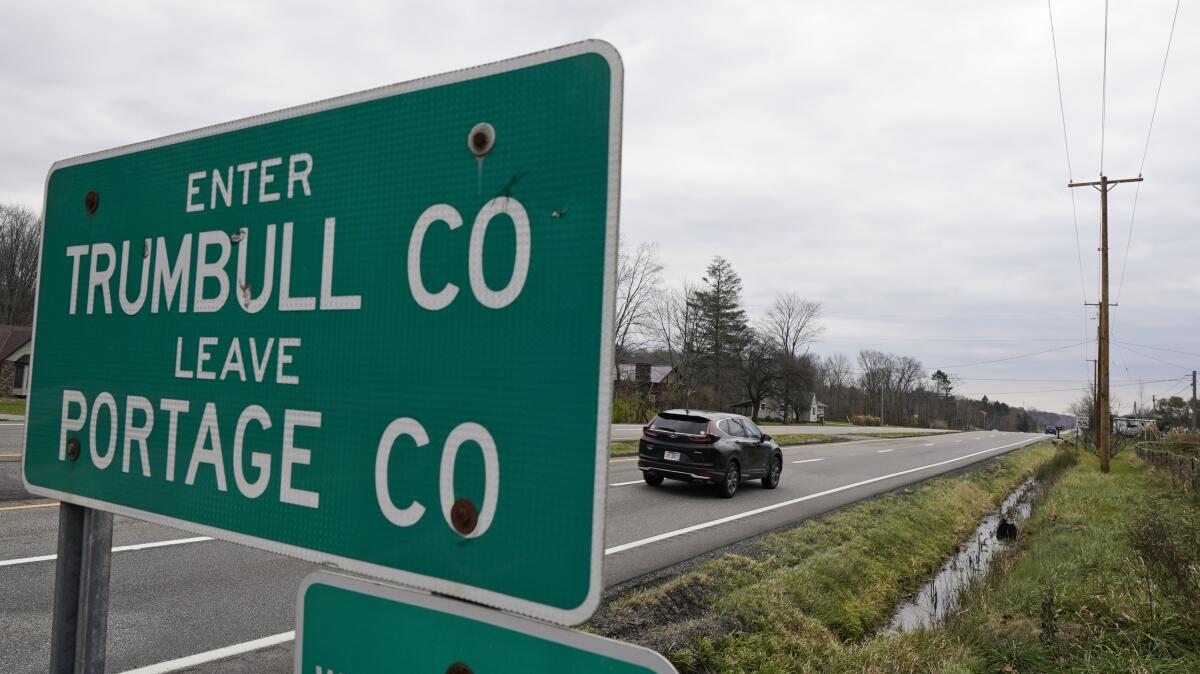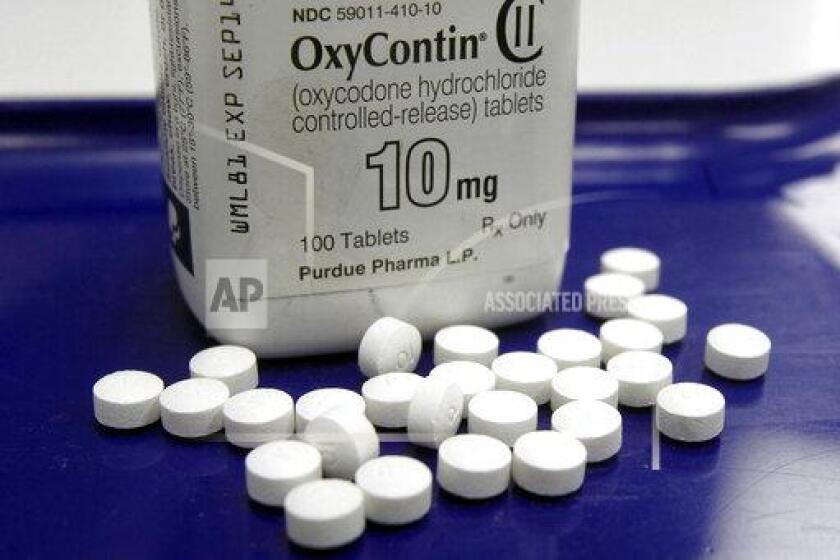Federal jury holds CVS, Walgreens, Walmart pharmacies responsible for role in opioid crisis

- Share via
CLEVELAND — CVS, Walgreens and Walmart pharmacies recklessly distributed massive amounts of pain pills in two Ohio counties, a federal jury said Tuesday in a verdict that could set the tone for U.S. city and county governments that want to hold pharmacies accountable for their roles in the opioid crisis.
Lake and Trumbull counties blamed the three chain pharmacies for not stopping the flood of pills that caused hundreds of overdose deaths and cost each of the two counties about $1 billion, their attorney said.
How much the pharmacies must pay in damages will be decided in the spring by a federal judge.
It was the first time pharmacy companies had completed a trial to defend themselves in a drug crisis that has killed a half-million Americans over the last two decades.
The counties were able to convince the jury that the pharmacies played an outsized role in creating a public nuisance in the way they dispensed pain medication into their communities.
“The law requires pharmacies to be diligent in dealing drugs. This case should be a wake-up call that failure will not be accepted,” said Mark Lanier, an attorney for the counties.
“The jury sounded a bell that should be heard through all pharmacies in America,” Lanier said.
As the opioid epidemic continues to claim lives, UC Irvine researchers have identified the extract of the plant Corydalis yanhusuo that may help fight opiate addiction.
Attorneys for the three pharmacy chains maintained they had policies to stem the flow of pills when their pharmacists had any concerns and would notify authorities about suspicious orders from doctors. They also said it was the doctors who controlled how many pills were being prescribed for legitimate medical needs.
Spokespeople for CVS Health and Walgreen Co. said the companies disagree with the verdict and will appeal.
“As plaintiffs’ own experts testified, many factors have contributed to the opioid abuse issue, and solving this problem will require involvement from all stakeholders in our healthcare system and all members of our community,” CVS spokesperson Mike DeAngelis said in a statement.
Walgreen spokesperson Fraser Engerman said the company believes the court erred “in allowing the case to go before a jury on a flawed legal theory that is inconsistent with Ohio law.”
“As we have said throughout this process, we never manufactured or marketed opioids nor did we distribute them to the ‘pill mills’ and internet pharmacies that fueled this crisis,” Engerman said in a statement. “The plaintiffs’ attempt to resolve the opioid crisis with an unprecedented expansion of public nuisance law is misguided and unsustainable.”
Two other chains — Rite Aid and Giant Eagle — already had settled lawsuits with the two Ohio counties.
Purdue Pharma discussed diverting online readers away from L.A. Times stories about its marketing of OxyContin and the opiois crisis, court records show.
Lanier said during the trial that the pharmacies were attempting to blame everyone but themselves.
The opioid crisis has overwhelmed courts, social services agencies and law enforcement in Ohio’s blue-collar corner east of Cleveland, leaving behind heartbroken families and babies born to addicted mothers, Lanier told jurors.
Roughly 80 million prescription painkiller pills were dispensed in Trumbull County alone from 2012 to 2016 — equivalent to 400 for every resident.
In Lake County, some 61 million pills were distributed during that period.
The rise in physicians prescribing pain medications such as oxycodone and hydrocodone came at a time when medical groups began recognizing that patients have the right to be treated for pain, Kaspar Stoffelmayr, an attorney for Walgreens, said at the opening of the trial.
The problem, he said, was that “pharmaceutical manufacturers tricked doctors into writing way too many pills.”
The counties said pharmacies should be the last line of defense to prevent the pills from getting into the wrong hands.
They didn’t hire enough pharmacists and technicians or train them to stop that from happening and failed to implement systems that could flag suspicious orders, Lanier said.
The trial before U.S. District Judge Dan Polster in Cleveland was part of a broader constellation of federal opioid lawsuits — about 3,000 in all — that have been consolidated under the judge’s supervision. Other cases are moving ahead in state courts.
Kevin Roy, chief public policy officer at Shatterproof, an organization that advocates for solutions to addiction, said the verdict could lead pharmacies to follow the path of major distribution companies and some drugmakers that have reached nationwide settlements of opioid cases worth billions.
No pharmacy has reached a nationwide settlement.
“It’s a signal that the public, at least in select places, feels that there’s been exposure and needs to be remedied,” Roy said.
Roy noted that courts have not been consistent on whether public nuisance law applies to such cases. “There’s been a variety of different decisions lately that should give us reason to be cautious about what this really means in the grand scheme,” he said.
It was one of five trials so far this year in the U.S. to test claims brought by governments against parts of the drug industry over the toll of prescription painkillers.
Trials against drugmakers in New York and distribution companies in Washington state are underway. A trial of claims against distribution companies in West Virginia has wrapped up, but the judge has not yet given a verdict.
Earlier in November, a California judge ruled in favor of top drug manufacturers in a lawsuit with three counties and the city of Oakland. The judge said the governments hadn’t proved that the pharmaceutical companies used deceptive marketing to increase unnecessary opioid prescriptions and create a public nuisance.
Also in November, the Oklahoma Supreme Court overturned a 2019 judgment for $465 million in a suit brought by the state against drugmaker Johnson & Johnson.
Other lawsuits have resulted in big settlements or proposed settlements before trials were completed.
The jury’s decision in Cleveland had little effect on the stocks of CVS, Walgreens and Walmart. Shares of all three companies rose Tuesday. Shares of CVS and Walgreens are up 36% and 19% this year, respectively.
Associated Press writer Geoff Mulvihill in Cherry Hill, N.J., contributed to this report.
More to Read
Sign up for Essential California
The most important California stories and recommendations in your inbox every morning.
You may occasionally receive promotional content from the Los Angeles Times.











